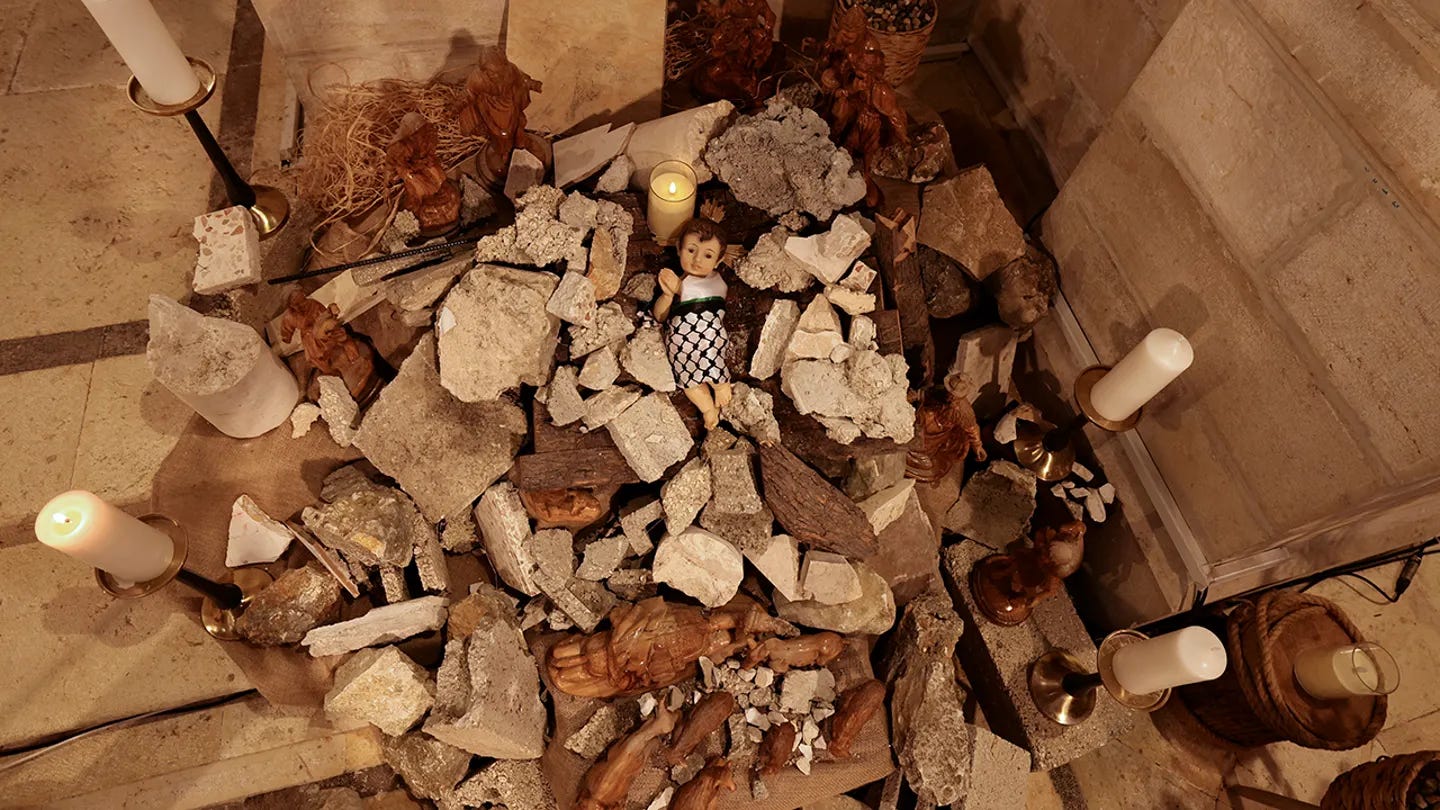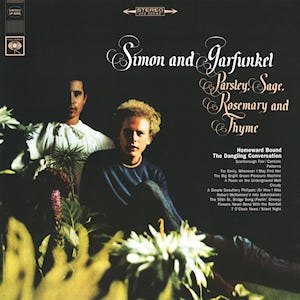This reflection was delivered at the Christmas Eve candlelight service at Canyon Community Presbyterian Church on Dec. 24, 2023.
Tonight we gather for a very special service, as we prepare to celebrate the birth of the Christ child. It’s usually one of the most joyous times of the year, looked forward to by child and adult alike as a time of family, a time of remembering, a time of celebrating.

This year feels different, though. As I was trying to think of what to say to you tonight, my mind went back to my teenage years – which were a long time ago. I figure most of you either remember, or have at least heard of Simon and Garfunkel. Like so many popular acts, they split long ago, before many folks alive today were even born.
sBut those of us of a certain age grew up singing along with the radio to songs that seemed to capture our imagination or our feelings.
There’s one song of theirs that I don’t think ever got much if any airtime. It’s the last track on their album Parsley, Sage, Rosemary and Thyme. (I think I see some of you nodding, remembering that album and songs such as Scarborough Fair/Canticle, Homeward Bound and Feelin’ Groovy.)
But do you remember 7 O’Clock News/Silent Night? It starts out with the duo singing a traditional, beautiful version of Silent Night. But as the song goes on, you become aware of a voice in the background delivering a newscast. By the end of the newscast, it has become equally, if not more, as clear as the song.
That album is from 1966 – 57 years ago. While the issues in the newscast are from that era – racial unrest, the Vietnam war, civil turmoil – it’s easy to hear echoes of what surrounds us today – racial inequality (still), huge and growing gaps between the haves and have nots, anger at everything, the list can go on.
But specifically on my mind tonight is what’s happening in the Middle East and Western Europe.
Here’s what NPR says is, or more accurately what is NOT, happening in Bethlehem this day:
“This year there will be no Christmas in the city that is synonymous with the birth of Jesus, located in the Israeli-occupied West Bank. Last month, Palestinian leaders of Christian denominations here came together, and citing the devastating war in Gaza made a unanimous decision to cancel public celebrations.
“There's no Christmas tree or sparkling lights in Manger Square or along the cobble-stone streets that should be bustling with foreign tourists this time of year. There will be no Christmas parade with musicians weaving through the old city's labyrinth walkways, no Santas on street corners doling out joy to children. Instead, the main square is a simple parking lot, without a hint of holiday decoration to be seen.”
My purpose is not to cast a pall over Christmas. On the contrary, my purpose is to remind us how much the world that Jesus entered is so very much like the one we’re in now.
And that is indeed good news, worthy of singing, worthy of angels, worthy of celebration.
Over the 2,000 or so years since that event, however, our understanding of, our belief about what being a follower of Christ means seems to have been lost or at the very least obscured by all that we have heaped on the story.
For example, we have a romanticized version of events. First, there was no “decree [that] went out from Caesar Augustus that all the world should be registered. This was the first registration and was taken while Quirinius was governor of Syria.”1 There is no historical record of such a thing happening, and besides, the timing of Quirinius in Syria does not match up with Herod’s reign.
There are many more discrepancies between the birth accounts we get in Matthew and Luke, but no need to go into them here. If you’ve a mind, a simple Google search will bring up all sorts of efforts and theories to reconcile the Matthew and Luke versions, or explain why they don’t really disagree.
But all that effort obscures the point of what the birth of the Christ child represents. There is no doubt that Jesus was born in a land occupied by the Romans, who ruled with the proverbial iron fist. There is no doubt that many of the religious leaders of the time were collaborators with the Empire, if only to keep the masters at bay, and give themselves privilege.
Civil and religious authority worked in conjunction to keep the lid on and, not incidentally, maintain some authority and power. Jesus came to blow that lid off, to return justice to God’s creation. Jesus was a rebel, a social justice advocate.
Jesus offered/offers the world a different vision than one lived under religious or political tyranny.
We like to talk about salvation. Jesus talks about feeding the hungry.
We like to talk about what Christians should believe. Jesus talks about what Christians should do.
We like to talk about obeying. Jesus talks about helping.
And lest we forget, we profess belief in a trinitarian God, that is that God, Jesus and the Holy Spirit are all one. As it says in John 1:1, as translated by the New Revised English Bible, “In the beginning the Word already was. The Word was in God’s presence, and what God was, the Word was. He was with God at the beginning, and through him all things came to be; without him no created thing came into being. In him was life, and that life was the light of mankind. The light shines in the darkness, and the darkness has never mastered it.”
So when Jesus is talking, God is talking, but I fear we haven’t listened for a long time.
Here are other things Jesus talks about:
“In everything do to others as you would have them do to you, for this is the Law and the Prophets. (Matthew 7:12)
“Truly I tell you, just as you did it to one of the least of these brothers and sisters of mine, you did it to me. … [and] Truly I tell you, just as you did not do it to one of the least of these, you did not do it to me.” (Matthew 25:40,45)
After the Resurrection, the risen Jesus asked Peter:
“Simon son of John, do you love me more than these?” [Peter] said to him, “Yes, Lord; you know that I love you.” Jesus said to him, “Feed my lambs.” A second time he said to him, “Simon son of John, do you love me?” He said to him, “Yes, Lord; you know that I love you.” Jesus said to him, “Tend my sheep.” He said to him the third time, “Simon son of John, do you love me?” Peter felt hurt because he said to him the third time, “Do you love me?” And he said to him, “Lord, you know everything; you know that I love you.” Jesus said to him, “Feed my sheep.” (John 21:15-17, 19b) (Pretty clear what our task is, isn’t it?)
In the Beatitudes, Jesus blesses many actions and situations – the fearful, the poor, the hungry and thirsty, the peacemakers, the merciful, the martyrs, the persecuted; he said nothing about believing certain things. (Matthew 5:3-11)
When asked by the Pharisees what was the Greatest Commandment, Jesus said nothing about doctrine, but replied: “‘You shall love the Lord your God with all your heart and with all your soul and with all your mind.’ This is the greatest and first commandment. And a second is like it: ‘You shall love your neighbor as yourself.’ On these two commandments hang all the Law and the Prophets.” (Matthew 22:37-40)
Every Christmas Eve we read from Isaiah, cataloging the names of the Messiah. This is a passage which led George Frideric Handel to write one of the most beautiful and upbeat sections of the Messiah. It’s called Unto Us a Child is Born, and it’s part of the first, Christmas, section: WON-derful, COUN-selour, Almighty God, the everlastingFather, the Prince of Peace. I can’t even say it with the lilt Handel wrote.
I wanted to mention that because its uplifting and celebratory tone helps us remember that when God walked among us the first time, the world was a dangerous place, with cruel rulers, and people fighting for power. The words of God had been twisted by the religious authorities to give themselves power and authority over how people acted and what they thought. People were secondary to the Empire and the individual mattered little.
The world into which God/Jesus came was one without much hope for the least among us. In many ways, the entire world is trying to be that again as politicians and governments around the world rail against the “other,” and call for separation, call for purity of blood, spew hate and vindictiveness on any who would oppose them. Who degenerate some of God’s children, calling them “deplorable” or “vermin.”
But the birth of a small child was the dawn of hope again entering the world.
And it still is.
So tonight, we will still sing Joy to the World, because a child was born unto us 2,000 years ago who promises and teaches a different way: a way where all of God’s children are held in high regard, take care of each other, respect each other.
And that, my friends, is the Good News of this night.
To God alone be the glory.
Let us pray, now, the prayer Jesus taught his disciples and teaches us to pray, saying:
Our Father who art in heaven, hallowed be thy name.
Thy kingdom come, thy will be done, on earth as it is in heaven. Give us this day our daily bread;
and forgive us our debts, as we forgive our debtors;
and lead us not into temptation, but deliver us from evil.
For thine is the kingdom and the power and the glory, forever. Amen.
Luke 2:1-2




